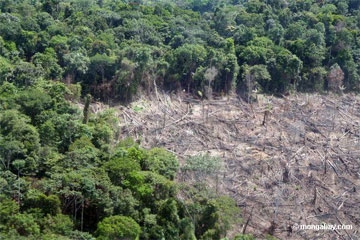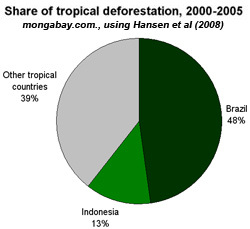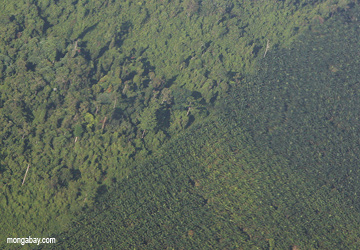The major drivers of tropical deforestation have changed in recent decades. According to a forthcoming article, deforestation has shifted from poverty-driven subsistence farming to major corporations razing forests for large-scale projects in mining, logging, oil and gas development, and agriculture. While this change makes many scientists and conservationists uneasy, it may allow for more effective action against deforestation.
Rhett A. Butler of Mongabay.com, a leading environmental science website focusing on tropical forests, and William F. Laurance of the Smithsonian Tropical Research Institute in Panama believe that the shift to deforestation by large corporations gives environmentalists and concerned governments a clear, identifiable target that may prove more responsive to environmental concerns.
“Rather than being dominated by rural farmers, tropical deforestation now is substantially driven by major industries—especially large-scale farming, mining, and logging,” explained Laurance. “Although this trend is pretty scary, it’s also much easier to target a handful of globalized corporations than many millions of poor farmers living on the frontier.”

|
Thirteen million hectares (33 million acres) of tropical forest are destroyed every year according to the United Nations. Although the number hasn’t changed much over recent decades, the forces behind the destruction has. Butler and Laurance write that globalization of the financial market and a worldwide commodity boom have created a perfect storm for corporate exploitation of tropical forests. In addition, increasing demand for grain, edible oils, and meats, driven by a thirst for biofuels and rising standards of living in developing countries, are also factors in the destruction. At the same time many governments have allowed international corporations to clear forests due to pressures to develop locally.
Such changes may make preserving the rainforest more feasible, argues Butler: “It is easier for pressure groups to target corporations and enterprises rather than tens of millions of poor farmers who are simply trying to put food on the table for their families.”

|
Environmental organizations have already increased their pressure on corporations recently with some positive effects.
“Green groups are learning to use public boycotts and embarrassment to target the corporate bad guys,” said Butler. “And it works—we’re already seeing the global soy, palm oil, and timber industries beginning to change their approach. They’re realizing they can’t run roughshod over the environment—it’s just too risky for them.”
“In addition, some massive financial firms, including Goldman Sachs, JP Morgan Chase, Citigroup, and Bank of America, have altered their lending practices after coming under fire from environmentalists,” Butler added.
But shaming corporations who participate in large-scale deforestation is not enough argues Laurance. “Environmental groups are using carrots as well as sticks. Many multinational corporations are developing greener products because they’re more profitable. For example, the market for eco-friendly timber products is expected to be worth tens of billions of dollars in the U.S. by 2010.”
 Oil palm plantation and logged-over forest in Borneo.  Mining road in Suriname. |
However, there remain challenges. Butler and Laurance state that some markets, most notably in Asia, currently display less preference for environmentally-friendly goods. Further, government policies often lead to indirect deforestation, for example massive U.S. subsidies for corn ethanol have contributed to deforestation in the Amazon, as Brazil has taken up the food market the U.S. has abandoned for biofuels. Another challenge is catching companies who deceitfully sell ‘green’. Increasingly companies seek to fortify their bottom line and reputation by employing “greenwashing” techniques to sell products as ‘sustainable’, when in fact are not. These companies are riding on the ‘green’ coattails without undergoing any material changes. Laws have not yet caught up to such deceptive practices.
Nevertheless Butler and Laurance are cautiously optimistic that markets for ecosystem services from tropical forests—including carbon storage, flood protection, rainfall, and biodiversity—may play a large role in protecting tropical forests in the future.
“If ecosystem services markets can make conservation of natural forests a profitable endeavor for enterprise, the opportunity cost of deforestation will increase dramatically,” said Butler. “The net result could be enterprise-driven preservation of wild lands.”
In the meantime, the best force against deforestation is to target the corporations implicit in the destruction. “We argue that the public and green groups need to send a loud, clear message to the corporate sector,” said Laurance. “There’s just no profit in destroying the natural world.”
Laurance and Butler’s article “New strategies for tropical forest conservation” will be featured in the September issue of the journal Trends in Ecology & Evolution.
PDF version of the paper
Other versions of the paper: Spanish | Portuguese | Indonesian | German | Indonesian | Malay | French